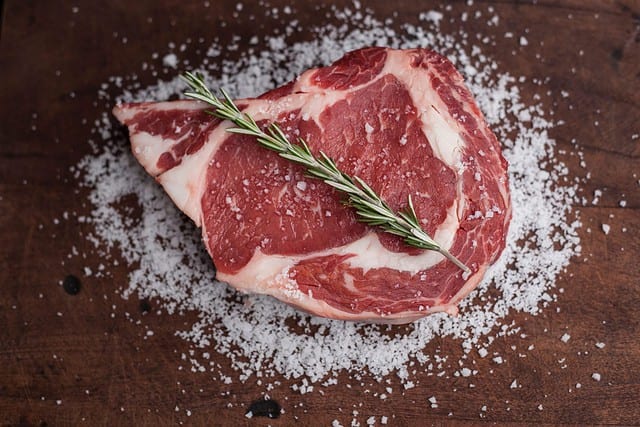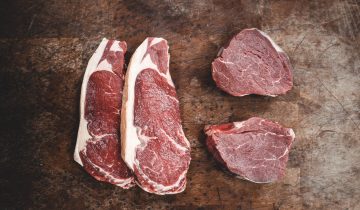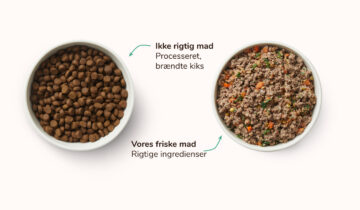There are many different diets for dogs, and it can be difficult as a dog owner to decide which one is best for our best four-legged friends. In the following, we will review a wide range of ingredients – both protein sources, carbohydrates in the form of selected vegetables and rice and vitamins and minerals – and finally we will emphasize what dogs are absolutely not allowed to eat.
The article is written by a veterinarian with expertise in dog nutrition, and sources can be found at the bottom of the page.
Dogs need a balanced diet
Dogs are largely carnivores, and there are some conditions where dogs may be forced to become omnivorous due to lack of prey in the wild or under harsh weather conditions. Dogs have been omnivorous for centuries and their bodies have evolved to quickly digest starch. To meet their nutritional requirements, a combination of plant and animal feeds must be provided to achieve a balanced diet.
Dog food should consist of a lot of protein and fat from meat. However, dogs are able to absorb nutrients from multiple plant sources as long as these are treated properly. To ensure the right balance of energy, protein, fat, carbohydrates, vitamins and minerals, most dog food contains both animal and vegetable sources of nutrition.
When looking at the ingredient list, keep in mind that the feed that contains the most of stands first. However, you should also be aware that the ingredients can be stated both in dry weight and in fresh weight.
For example, one kilo of chicken meat meal contains more protein than one kilo of fresh chicken meat. A rule of thumb, however, is that you must be able to find an animal protein source (preferably in dry weight) one of the first 3 places on the ingredient list if you want a feed with good absorption.
It is therefore important to ensure that your dog eats the right kind of food from the start, and most importantly, it should be a balanced diet consisting of a healthy amount of protein, carbohydrates and fat.
Nutrients in dog food are divided into the following categories:

Protein
Fish, chicken, lamb, beef, pork, game, etc. Dear child has many names. These are all animal proteins suitable for dog food. In addition, there are plant ingredients such as soybeans and corn gluten, and in fact, soybean meal is considered one of the richest forms of plant-based proteins. Proteins are the essential amino acids that provide hair, skin, nails, tendons, muscles and ligaments. In addition, proteins play a central role in hormone production. To ensure his dog a healthy and active life, it is necessary to provide a complete diet. Protein is an important component of a dog’s diet – just like with us humans.
Proteins play important roles in the body, such as:
- Preservation of skin structure, nails and muscles
- Maintaining the activity of the immune system
- Formation of enzymes
How much protein does your dog need?
The protein requirements of dogs vary according to their age. Researchers recommend that a puppy’s diet should consist of 29% protein (by weight), whereas an adult dog’s diet should consist of just 18% protein. The total calories in a dog diet should be 25% from proteins.
What are the best proteins for dogs?
When you look at the label, you should see meat listed as the first ingredient. Here are some common, healthy protein sources:
- Chicken
- Fish (salmon, whitefish)
- Pork
- Beef
- Turkey
- Spirit
- Lamb
- Rabbit
Read the various healthy protein sources for dogs and which ones are especially good for active or dogs with allergies.
Cool
Poultry, fish and some oils are rich in fats. Too much fat causes obesity in dogs – just like with us humans. It is about the right balance both in relation to. fat intake and exercise. Other sources of fat include vegetable oils and flaxseed. They provide some vital body functions such as maintaining body temperature, controlling inflammation and many more. Fat also provides essential omega 6 and omega 3 fatty acids. Both types of fatty acids are essential for skin and fur maintenance and proper membrane function.
Fats provide 2.5 times more energy than proteins, but their digestion is slightly more complex than protein digestion is in dogs. Commercial dog food usually contains 5-20% fat, but it can be increased to a supply of 25-50% in dogs with more significant energy needs during breastfeeding, growth (puppies) and physical exertion.
Carbohydrates
Carbohydrates provide light energy in the body. The sources of carbohydrates with the most energy are plants and grains. In addition, carbohydrates are also characterized as sugar and fiber, which provide energy.
When we talk about carbohydrates in dog food, there is no general recommendation from research in the field because dogs do not immediately have any nutritional need for carbohydrates. Dogs basically only need energy from a diet of protein and fat. An acceptable diet with a minimal carbohydrate content, consists of 14% carbohydrates. Dogs can easily convert sugars such as glucose or fructose into working energy.
Vitamins and minerals
Both vitamins and minerals are essential for bone growth, blood clotting and energy production. Vitamins such as A, D, E, K are fat-soluble vitamins, while B-complex vitamins and vitamin C require water for absorption in the body.
We have elaborated selected vegetables further down the page. Here you can read about their benefits and what vitamins and minerals they contain.
This is something to consider when feeding your dog
The following points are considerations you need to be aware of when feeding your dog:
- Cooked meat such as chicken or lamb cooked in accordance with cooking at home is good for your dog because it is fresh and without preservatives. Unfortunately, there is a lot of dog food that contains preservatives and it is not good for a dog’s health.
- Preserved meat such as tuna and salmon should be fed occasionally and not regularly because tuna contains methylmercury, which is dangerous to the dog’s health. second, canned food preservatives can cause harmful effects.
- The addition of raw grated carrot, pumpkin, peas and beans will add fiber to the dog’s diet
- Do not give your dog boiled bones or toxic substances like onion sauce. It may sound harmless, but this type of food is harmful to your dog’s health.
- Food hygiene must be ensured at all times so that your dog does not get any dangerous bacterial infection such as. salmonella and campylobacter.
- It is always a good idea to consult a veterinarian who is a dog nutritionist who can explain the optimal diet plan for your dog.
Dog food with Rice is gluten-free dog food
Rice is a wonderful source of carbohydrates for dogs. In addition to carbohydrates, rice contains both protein and fiber. In addition, rice is a good source of vitamin D and iron. Vitamin D controls the level of calcium and phosphorus, and iron helps in the formation of hemoglobin, which transports oxygen from the lungs to the body’s tissues such as muscles and brain.
In addition to the health benefits of rice, many dogs like the taste of rice in their food, and in addition, a dog’s digestive system benefits from rice. Since white rice contains shells and bran, the amount of the total fiber content decreases and the calorie content increases slightly compared to brown rice.
When dogs have diarrhea, veterinarians often recommend giving the dog boiled white rice with boiled chicken because this combination soothes the gastrointestinal tract and the ingredients’ content of both fiber and starch adds firmness and mass to the stool. Here is our fresh dog food with rice:
What Dogs DON’T EAT
It can be hard as a family not to “pamper” your four-legged family member Dogs are considered the best companions for our family; feeding them some food can be harmful. Dogs cannot eat greasy or greasy food; they may get diarrhea. The following are the toxic foods for dogs.
- Avocado – contains persin, which is toxic because it affects the dog’s mammary glands and heart.
- Bones – from poultry pose a potential risk to all dogs because they can splinter and get stuck in the esophagus and / or stomach. You can, however, give your dog raw beef bones, but if your dog is not used to eating bones, then you should give it in small amounts so as not to risk your dog getting diarrhea.
- Chocolate – contains theobromine, which is dangerous because it affects several parts of the body, such as the nervous system, breathing and urinary tract.
- Grapes and raisins – may cause acute renal failure in some dogs.
- Rodenticides – a poison used to kill rodents and which can also be fatal to dogs.
- Insecticides – a substance used to kill insects and which can also be fatal to dogs.
- Drugs – such as acetaminophen, ibuprofen and naproxen20.
- Nuts – contain a high content of fungal spores, are often very salty and can get stuck in the throat. In addition, macadamia nuts in particular contain an unknown toxin that affects muscles, digestive system and nervous system.
- Salt – binds fluid in the body and can therefore give the dog salt poisoning in high doses. Well, it does appear as vomiting in the beginning, but if your dog does not receive treatment, the symptoms can worsen and the condition can become very serious – even fatal.
- Fungi – Many species of fungi are less suitable for dogs and some are poisonous.
- Tulips , daffodils and flower bulbs – many flowers and especially bulbous plants are poisonous. If your dog has dug up freshly planted flower bulbs, it is important to talk to your veterinarian to find out if the species in question is toxic to animals.
- Rhubarb and rhubarb leaves – contains oxalic acid, which in high doses can be fatal. should not be given too often to the dog as it inhibits the formation of red blood cells.
- Xylitol – is an artificial sweetener found in many foods and especially in chewing gum. If your dog gets too much xylitol, it will cause your dog’s blood sugar to drop, which can cause permanent liver damage .
SO How do you ensure that your dog gets all the nutrients it needs
To ensure that your dog gets all the nutrients he needs in a day, choose a balanced diet that includes a mixture of all the necessary food sources, such as proteins, carbohydrates, vitamins, minerals and fats. . Always take into account your dog’s age and physiological needs. This is extremely important for your dog to be happy and healthy.
Try our fresh dog food with recipes prepared by a dog nutritionist




 No products in the cart.
No products in the cart.